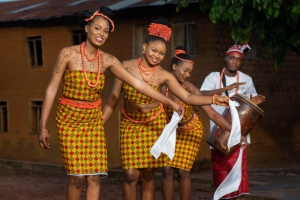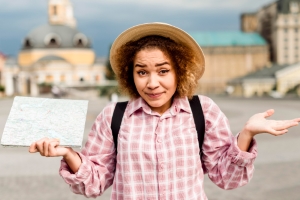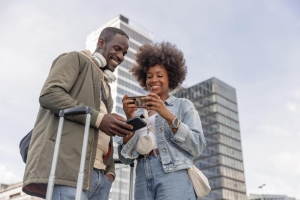Introduction
Namibia is a diverse and culturally rich country, home to a variety of ethnic groups, languages, and traditions. Understanding local customs and etiquette will help you connect with the people, show respect, and make the most of your visit.
Whether you’re visiting a Himba village, dining in Windhoek, or greeting locals in the countryside, this guide covers everything you need to know about Namibian culture and etiquette.
1. Greetings & Social Etiquette
Namibians are friendly and welcoming, and greetings are an important part of social interactions.
✅ Handshakes are common – A handshake, often combined with a friendly nod or smile, is the standard greeting.
✅ Use both hands – Holding your right elbow with your left hand while shaking hands shows extra respect, especially among older people.
✅ Greeting customs vary by culture – Some ethnic groups, like the Ovambo, may clap hands while greeting.
✅ Always greet before starting a conversation – Whether entering a shop, asking for directions, or speaking to locals, start with a greeting like:
- “Good morning” / “Good afternoon”
- “Hallo” (Afrikaans)
- “Wa lalapo” (Oshiwambo)
👉 Tip: In rural areas, greetings are longer and more formal, so take your time when interacting with locals.
2. Language & Communication
Namibia has more than 10 languages, but English is the official language. However, Afrikaans, German, and indigenous languages (like Oshiwambo, Otjiherero, and Damara/Nama) are widely spoken.
💬 English is understood in cities and tourist areas, but in rural areas, you may need basic Afrikaans or local phrases.
💬 Afrikaans is the most commonly spoken language for informal communication.
💬 German is still spoken, especially in Swakopmund and Lüderitz.
💬 Indirect communication is common – Namibians value politeness and subtlety, so avoid being too blunt.
👉 Tip: Learning a few basic greetings in Oshiwambo or Afrikaans will be greatly appreciated by locals!
3. Dress Code & Modesty
Namibia has a relaxed but modest dress culture, influenced by its traditional values and hot climate.
👕 Casual clothing is acceptable in cities – T-shirts, jeans, and light dresses are fine.
👚 Dress modestly in rural areas – Avoid revealing clothes when visiting villages or religious sites.
👒 Protect yourself from the sun – Wear a hat, sunglasses, and sunscreen due to the strong desert sun.
🩳 Swimwear is for beaches & pools only – Cover up when leaving the water.
👉 Tip: If visiting a Himba village, women are topless as part of their culture—this is normal and should be respected.
4. Cultural Sensitivities & Respecting Traditions
Namibia’s culture is deeply rooted in tradition, so it’s important to be mindful of customs and social norms:
🛖 Visiting Villages
- Always ask permission before entering a village or taking photos of locals.
- Greet the village chief or elder first as a sign of respect.
- If invited inside a home, remove your hat and follow your host’s lead.
📸 Photography Etiquette
- Always ask before taking photos of people, especially in rural areas.
- Some communities, like the Himba, may expect a small donation for photographs.
- Avoid taking photos of government buildings or military sites.
🙏 Religious & Spiritual Practices
- Christianity is widely practiced, but Namibia also has indigenous beliefs.
- Respect sacred sites and avoid disturbing traditional ceremonies.
🚫 Taboos to Avoid
- Do not point with your index finger – Use your whole hand or thumb instead.
- Avoid talking about politics with strangers—topics like colonial history and land ownership can be sensitive.
- Do not mimic or make fun of local accents or traditions—it can be seen as disrespectful.
👉 Tip: If unsure about something, ask politely—locals appreciate travelers who make an effort to understand their culture.
5. Food & Dining Etiquette
Namibian cuisine blends indigenous, German, and South African influences, with game meat, seafood, and maize-based dishes being common.
🥩 Meat is central to Namibian cuisine, especially beef, lamb, and game meats like kudu or oryx.
🍽 Table manners are relaxed, but in formal settings:
- Keep your hands visible at the table.
- Wait for the host to start eating before you begin.
- It’s polite to finish your plate, as wasting food is frowned upon.
🥘 In rural areas, you may be served mahangu (pearl millet porridge) or traditional stews.
☕ German-style coffee & pastries are popular, especially in Swakopmund and Windhoek.
👉 Tip: If invited to a braai (BBQ), bringing a small gift (like drinks or snacks) is appreciated.
6. Tipping & Hospitality
Namibia is known for excellent hospitality, and tipping is expected in many service industries.
💰 Restaurants: 10-15% tip is common if service is good.
💰 Hotels: Tip porters N$10-20 per bag and housekeeping N$20 per day.
💰 Safari Guides & Drivers: A tip of N$50-100 per day is appreciated.
💰 Petrol Attendants: N$5-10 for services like windshield cleaning or tire checks.
👉 Tip: Always tip in Namibian dollars (NAD) or South African rand (ZAR), as foreign currency may not be accepted.
7. Public Behavior & Social Norms
Namibians are polite and reserved, and certain behaviors are considered inappropriate in public.
✅ Be respectful in conversations – Loud, aggressive, or confrontational behavior is frowned upon.
✅ PDA (Public Displays of Affection) are minimal – Holding hands is fine, but kissing in public is rare.
✅ Queuing is expected – Whether at banks, shops, or bus stations, wait your turn patiently.
✅ Do not litter – Namibia values its environment, so always dispose of trash properly.
👉 Tip: If invited to someone’s home, bring a small gift like fruit, snacks, or drinks as a token of appreciation.
8. Business Etiquette & Professionalism
If you’re in Namibia for business, professionalism and punctuality are key.
💼 Dress smartly for business meetings—formal attire is expected.
⏳ Be on time, but expect meetings to start with informal conversation before business begins.
🤝 Handshakes are essential, and a brief, polite chat before getting to the point is common.
👉 Tip: Exchanging business cards is appreciated in formal settings.
Conclusion
Namibia’s rich cultural diversity makes it a fascinating destination, and understanding local customs & etiquette will help you have a more enjoyable and respectful experience. Whether you’re exploring remote villages, enjoying a safari, or dining in Windhoek, showing respect and cultural awareness will make your trip even more memorable.✈️ Planning your Namibian adventure? Keep these etiquette tips in mind, and enjoy the warm hospitality of this beautiful country! 🌍🏜️







